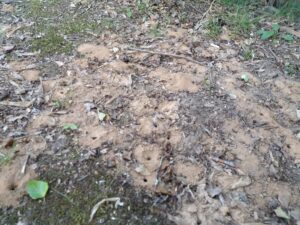Digger Bees
What’s the Buzz
Many times, the articles I write are influenced by the calls we are getting here at Canton Termite and Pest Control. Other times, I write about what I personally see around my own home. Today’s insect fits the latter category…digger bees.

I was out for a walk in our yard when I began to notice little mounds of dirt each with a hole in the middle. I knew right away it was an insect of some kind but had no idea what kind and which one. So, I went to the expert, that is my husband and the owner of Canton Termite. Tim immediately listened to my description and said with confidence, “Those are digger bees.” I love to learn so off I went to research and learn what I could about the curious habits of digger bees.
Here we go!
It can be hard to distinguish what type of bee you’re seeing in the yard, so as always, it is best to use caution. You definitely don’t want to confuse the docile digger bee with a more aggressive variety such as yellow jackets. So proceed with caution and always remember that an expert in the field is your best option.
Digger bees are ground-nesting bees that may cause alarm but are generally harmless. Unless you are the super curious type who wants to cuddle one in your hand or stick your finger inside their nest, the chance of getting stung is low. They are considered a helpful bug since they are pollinators and also control bad insect pests in the area. So, despite the fact that they make little mounds of dirt in your yard, give the poor guys a break. They are hard at work. Other ground-nesters are sweat bees, bumblebees, cicada-killer wasps, and yellow jackets. The bumblebee and the yellow jackets are known to be more aggressive than most bees. While the digger bee is a curious one if you are close to their home, they aren’t usually a threat to humans, so don’t be too alarmed when they come over to say hi.
The digger bee is a solitary bee. Only one female lives in each nest. So you may see a digger bee community but know that only one female is living in each nesting site. There are actually more than 3,500 types of solitary bees here in North America. This solitary tendency is different than other bee and wasp nests such as bumblebees, honeybees, and yellow jackets who have many bees in one nest. Remember, many holes with one bee each are usually digger bees or solitary bees that sting only as a last option, while one hole with many bees coming in and out signals the presence of more aggressive bees.
Another thing I noticed about the digger bees in my yard is their location. Some areas have lots of them while others have none at all. Why? Entomologists believe that the ground-nesting bees look for areas with morning sun and where the soil is draining well. They also like soil with very little organic matter. In other words, my bare ground areas where the grass isn’t growing well is a popular digger bee hangout.
If you are concerned about the digger bee, you can always water heavily with irrigation or a sprinkler system to discourage the little diggers. Planting and maintaining heavy grass is a good way to make your lawn less than perfect for them.
The truth is that the digger bee is not likely to bother you or hurt your lawn. The female piles some dirt around the hole and stocks her nest with food such as pollen and nectar to feed the babies. In four to six weeks, the bees will go on their way. April and May are generally the highlights of digger bee activity.
Pesticides are not generally needed for digger bees. They are beneficial as pollinators and not aggressive to the humans around them. All in all, digger bees are pretty cool little insects. I hope you have learned some cool facts. I still plan to walk around and not through the bee community in my yard, but now I know who has moved into the neighborhood.
Welcome spring and welcome digger bees! My flowers and fruits are happy to see you around.
If you have any pest control or termite problems, call your local, family-owned Canton Termite and Pest Control.
By: Robin
